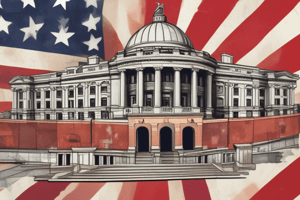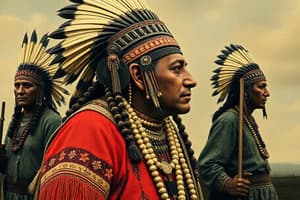Podcast
Questions and Answers
What is a characteristic of a confederal system of government?
What is a characteristic of a confederal system of government?
- Strong central government
- Power is shared equally among all levels of government
- Local governments have the most power (correct)
- Independent states have no autonomy
The United States operated as a confederation under the Articles of Confederation.
The United States operated as a confederation under the Articles of Confederation.
True (A)
Name one example of a confederal system of government.
Name one example of a confederal system of government.
The European Union
In a _____ system of government, power is concentrated in a central authority.
In a _____ system of government, power is concentrated in a central authority.
Match the following systems of government with their characteristics:
Match the following systems of government with their characteristics:
Which of the following countries has a federal system of government?
Which of the following countries has a federal system of government?
In a federal system, the central government holds all power without sharing it with state governments.
In a federal system, the central government holds all power without sharing it with state governments.
Name one example of a country that operates under a unitary system of government.
Name one example of a country that operates under a unitary system of government.
In a parliamentary system, the executive is chosen by the __________.
In a parliamentary system, the executive is chosen by the __________.
Match each country with its corresponding system of government:
Match each country with its corresponding system of government:
Which role does a Prime Minister hold in a parliamentary system?
Which role does a Prime Minister hold in a parliamentary system?
In a unitary system, lower levels of government have independent power.
In a unitary system, lower levels of government have independent power.
What is the primary characteristic of a federal system of government?
What is the primary characteristic of a federal system of government?
What is the role of King Charles III in the English government?
What is the role of King Charles III in the English government?
In a direct democracy, citizens vote on laws and policies themselves.
In a direct democracy, citizens vote on laws and policies themselves.
What type of government allows a family to maintain power across generations?
What type of government allows a family to maintain power across generations?
Saudi Arabia is an example of an __________ monarchy.
Saudi Arabia is an example of an __________ monarchy.
Match each form of government with its description:
Match each form of government with its description:
Which form of government is characterized by people choosing leaders to create policies?
Which form of government is characterized by people choosing leaders to create policies?
Socialism has never gained popularity in the United States.
Socialism has never gained popularity in the United States.
Name one type of initiative that allows people to influence legislation in some U.S. states.
Name one type of initiative that allows people to influence legislation in some U.S. states.
Who was the first leader of what would become the Soviet Union?
Who was the first leader of what would become the Soviet Union?
The power in an autocracy is shared among multiple leaders.
The power in an autocracy is shared among multiple leaders.
What is the term used for a government led by a wealthy elite or a small group?
What is the term used for a government led by a wealthy elite or a small group?
Under communism, the working people should control the 'means of __________.'
Under communism, the working people should control the 'means of __________.'
Match the forms of government with their definitions:
Match the forms of government with their definitions:
Which system of government allows the people to vote on all issues directly?
Which system of government allows the people to vote on all issues directly?
Communist countries have never led to dictatorships.
Communist countries have never led to dictatorships.
Name one country that currently has a communist government.
Name one country that currently has a communist government.
What does modern-day socialism aim to achieve?
What does modern-day socialism aim to achieve?
Marxist Leninism began after the Russian Revolution in 1917.
Marxist Leninism began after the Russian Revolution in 1917.
Who wrote the Communist Manifesto?
Who wrote the Communist Manifesto?
Communism advocates for __________ ownership of the means of production.
Communism advocates for __________ ownership of the means of production.
Which of the following is an example of a socialist policy?
Which of the following is an example of a socialist policy?
Match the following terms with their definitions:
Match the following terms with their definitions:
Socialist parties in Europe and the United States share identical ideals.
Socialist parties in Europe and the United States share identical ideals.
What major political event took place in Russia in 1917?
What major political event took place in Russia in 1917?
Study Notes
Systems of Government
- Definition of Systems: Refers to the distribution of power within a state or country.
- Key Types: Three main systems include Federal, Confederal, and Unitary.
Confederal System
- Overview: Characterized by a loose association of independent states with limited central authority.
- Power Dynamics: Local governments hold significant power; the central government has minimal authority.
- Historical Example: The United States operated as a confederation from 1776 to 1787 under the Articles of Confederation.
- Present-Day Example: European Union.
Federal System
- Definition: Power is shared between a central government and regional/state governments.
- United States Example: Citizens elect representatives at both national and state levels.
- Global Examples: Countries like Argentina, Germany, India, Nigeria, and Russia utilize federal systems.
Unitary System
- Description: Central government possesses all authority, delegating power to local governments as needed.
- Global Examples: England, France, and Italy operate under unitary systems.
Parliamentary System
- Function: The executive is chosen from the legislative branch, often leading to a fusion of powers.
- Example: The Prime Minister, such as Winston Churchill in England, is a member of Parliament.
Forms of Government
- Definition of Forms: Focuses on how governments operate, who holds the power, and the organization of governance.
Monarchy
- Types:
- Absolute Monarchy: Monarch has complete power (e.g., Saudi Arabia).
- Constitutional Monarchy: Monarch functions mainly as a ceremonial figure, with authority delegated to elected bodies (e.g., England).
Democracy
- Definition: A system where power rests with the people.
- Types:
- Direct Democracy: Citizens directly vote on laws and policies (e.g., Ancient Athens).
- Representative Democracy: Citizens elect representatives to make policy decisions (e.g., United States). Some states utilize direct democracy aspects such as referendums and initiatives.
Socialism
- Concept: The government plays an active role in regulating the economy and business operations, promoting equality.
- Modern Approach: Balances market economies with social welfare to address inequality and meet basic needs.
- Global Presence: Existing socialist parties in Europe and the U.S., with variations in socialist policies.
Communism
- Ideology: Advocates for collective ownership of production means, emphasizing equality.
- Historical Example: The Soviet Union between 1917 and 1990.
- Marxist Communism: Proposes a classless, stateless society where the proletariat controls production; stemming from Karl Marx's theories.
Governance Under Communism
- Marxist Leninism: Introduced a "temporary dictatorship," which solidified into permanent authoritarian rule under leaders like Joseph Stalin.
- Modern Communist States: Countries like China, Cuba, North Korea, Vietnam, and Laos maintain communist governance but often face criticism for authoritarian practices.
Additional Forms of Government
- Oligarchy: Rule by a small, often wealthy, group (e.g., elite families or political parties).
- Autocracy: Rule by a single individual, such as dictatorships and absolute monarchies.
Quick Reference Questions
- Federal System: Shares power between central and regional governments.
- Unitary System: Central government retains all power.
- Confederal System: Local states maintain significant power with a weak central authority.
- Parliamentary System: The executive is chosen by the legislative branch.
- Democracy: The people hold power.
- Monarchy: Governed by a king or queen.
- Socialism: Government controls certain businesses for public benefit.
- Autocracy: One person holds power.
- Direct Democracy: People vote on every issue.
- Means of Production: Controlled by the working class in a communist system.
Studying That Suits You
Use AI to generate personalized quizzes and flashcards to suit your learning preferences.
Related Documents
Description
Test your knowledge on confederal systems of government, particularly focusing on the historical context of the United States under the Articles of Confederation. This quiz includes questions about characteristics of confederal systems, examples, and comparisons with other government systems.




